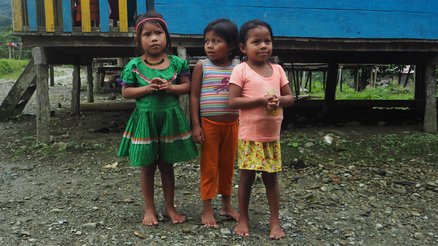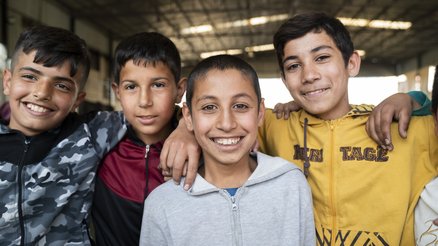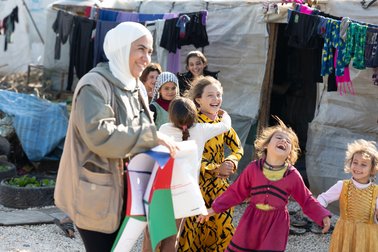Knowledge Hub
-
03/09/2023
Competency Assessment of Non-Specialists Delivering a Psychological Intervention in Lebanon: A Process Evaluation
There is an increasing need to improve the competency and quality of non-specialists delivering psychological interventions. As part of the Ensuring Quality in Psychological Support (EQUIP) initiative, this study evaluates the process of roleplay-based competency assessments using three tools to assess the competencies of facilitators delivering a psychological intervention for children in Lebanon. With a group of five competency raters, five facilitators and four actors, this study uses a mixed methods approach, comprising competency assessment data, qualitative interviews and focus group discussions. Findings of the study showed inter-rater agreement was generally acceptable after additional training of raters. Conclusions indicated that using roleplay-based competency assessments and preparing for competency-based training is feasible and useful to ensure quality control in mental health and psychosocial support (MHPSS) service provision.
Read more
-
07/18/2023
A systematic review of the literature on community-level child protection in low- and middle-income countries
This systematic review synthesizes the current state of literature on community-level child protection in LMICs. The aim of the review was to present available evidence and effective strategies that implementing agencies can use to support community-level structures, practices, resources and processes. The review highlights (1) a practice-research gap related to community-level approaches generally and more specifically in humanitarian settings; (2) the important role of different socio-ecological levels when implementing community-level interventions; and (3) a number of recommended strategies that implementing agencies can adopt in their work. Further studies, with a focus on outcomes for children, families and communities, are needed to broaden the current evidence-base and research on the applicability and effectiveness of community-level approaches in humanitarian settings is recommended to steer implementation in the sector.
Read more
-
03/01/2023
Feasibility randomised controlled trial of the Early Adolescent Skills for Emotions psychological intervention with young adolescents in Lebanon
Globally, there is a vast mental health treatment gap, whereby the majority of adolescents living in low- and middle-income countries requiring mental health services, do not have access to adequate care. To improve access, the World Health Organization (WHO) developed a range of interventions, designed to be low-cost and delivered by non-specialists. This study conducted a two-arm, individually randomised group treatment feasibility trial of a new WHO group intervention for young adolescents with emotional distress (‘Early Adolescent Skills for Emotions’; EASE) in Lebanon. The aim was to determine the feasibility of the intervention and study procedures.
Read more
-
06/24/2023
Effectiveness of the caregiver support intervention on child psychosocial wellbeing among Syrian refugees in Lebanon: Mediation and secondary analysis of a Randomized Controlled Trial
This study evaluates the impact of the nine session Caregiver Support Intervention (CSI) on improving children's wellbeing and examines putative mediators of changes in children's psychosocial wellbeing. 240 female caregivers were randomly allocated (1:1) to the CSI or a waitlist control comparison condition. The study was implemented in Lebanon, in an area characterized by high levels of poverty and a high number of the Syrian refugees. Here, a parallel group Randomized Controlled Trial method reported on caregiver-reported child-level wellbeing. The proportion of the total effect of the CSI intervention on child psychosocial wellbeing mediated by caregiver distress, caregiver wellbeing and harsh parenting was 77%. Overall, the study finds CSI holds potential for down-stream short-term effect on improving children's psychosocial wellbeing, beyond the previously reported positive caregiver outcomes.
Read more
-
10/31/2023
Reducing stigma impacting children and adolescents in low- and middle-income countries: The development of a common multi-component stigma reduction intervention
Stigmatisation impedes health and quality of life. Evidence regarding stigma reduction interventions is, albeit growing, limited. There is a gap in the availability and evidence of interventions for reducing stigma among children and adolescents, especially in low- and middle-income countries. This paper describes the process that led to a stigma reduction intervention impacting children and adolescents in low- and middle-income countries, following previously conducted formative research.
Read more
-
09/08/2023
Evaluation of the Early Adolescent Skills for Emotions (EASE) intervention in Lebanon: A randomized controlled trial
This study evaluates the effectiveness of a new group-based intervention developed by the World Health Organization (Early Adolescent Skills for Emotions; EASE), implemented by non-specialists, to reduce young adolescents' psychological distress among mostly Syrian refugees in Lebanon. Adolescents aged 10 to 14 years who screened positive for psychological distress using the Pediatric Symptom Checklist (PSC) were randomly allocated to EASE or enhanced treatment as usual (ETAU) (1:1.6). Due to the COVID-19 pandemic and other adversities in Lebanon at the time of this research, the study was prematurely terminated, resulting in an under-powered trial sample (n = 198 enrolled compared to n = 445 targeted). Thus, no conclusions can be drawn about the comparative effectiveness of the intervention given that the sample was underpowered as a result of early termination. Both EASE and single session psycho-education home visits resulted in meaningful improvements in reducing psychological distress.
Read more
-
09/13/2023
Interventions to increase help-seeking for mental health care in low- and middle-income countries: A systematic review
Mental health problems are a significant and growing cause of morbidity worldwide. Despite the availability of evidence-based interventions, most people experiencing mental health problems remain untreated. This treatment gap is particularly large in low- and middle-income countries (LMIC) and is due to both supply-side and demand-side barriers. The aim of this systematic review is to identify and synthesise the evidence on interventions to improve help-seeking for mental health problems in LMICs.
Read more